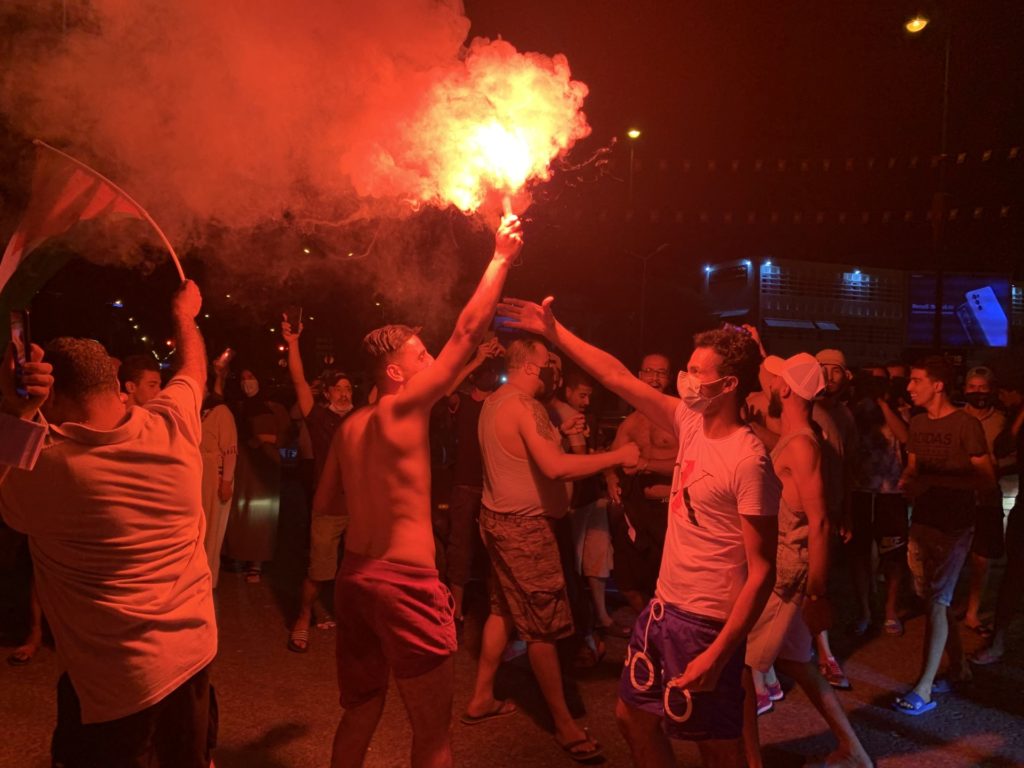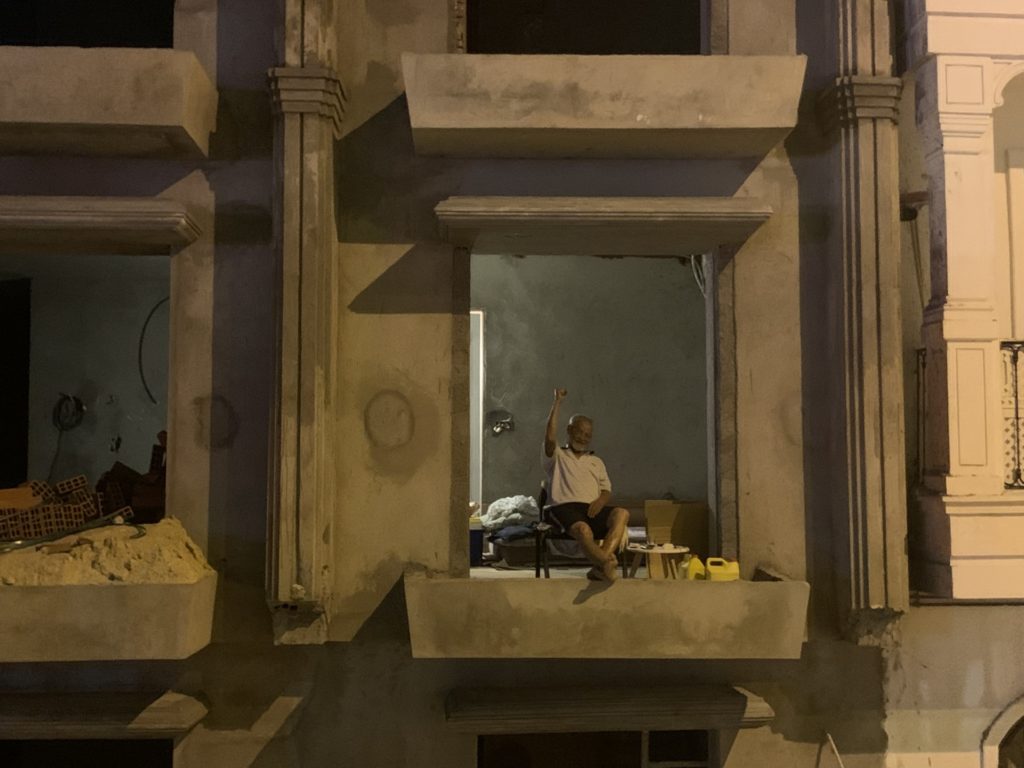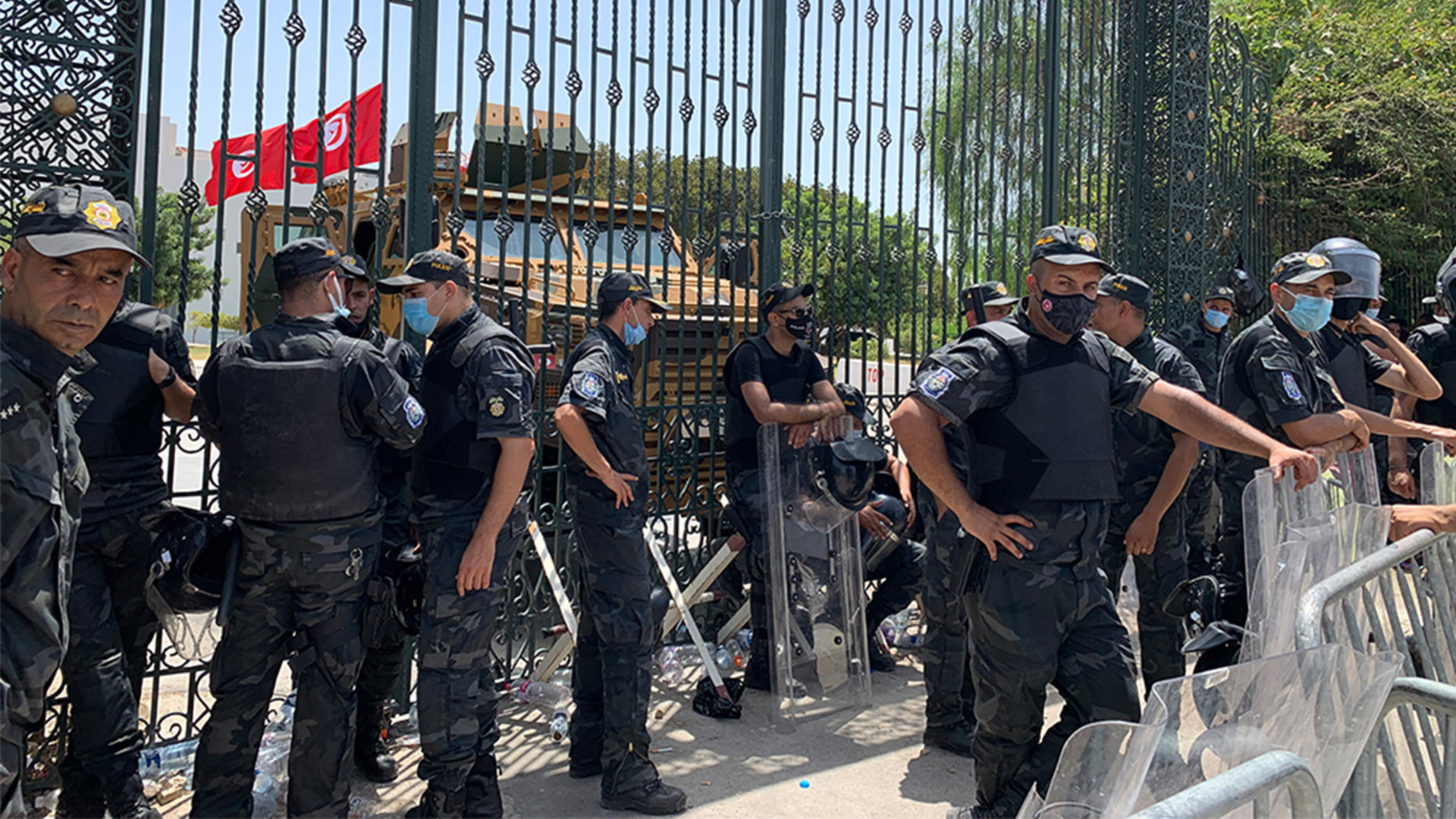Within minutes of Tunisian President Kais Saied’s shock decision on July 25 to sack his prime minister, freeze Parliament and assume all executive powers, the streets of Tunis had burst to life. Loud parades of cars, glittering fireworks and flares broke out in cities across the country. When the president sent in the army in to surround Parliament, crowds cheered the passing military vehicles.
Since last October, Tunisians had spent their evenings at home, unable to go outside after curfew, in line with the nation’s COVID-19 response. Those now out on the streets were visibly basked in this rare moment of public celebration.
“This was totally unexpected – as you can see there are people here in their pajamas,” said Nadia, a 23-year old student. “We are so excited, so enthusiastic about the future!”
“I feel like I’m reborn,” said another man, Adel Kazdeli, 56. “My future and the future of my children will be better because we got rid of this government.”
The country has been wracked by economic and political turmoil for a decade, but I arrived in Tunis at a particularly bad time: touching down at Carthage International just as the pandemic began its sweep across the world, the day before Tunisia shut its borders and began months of lockdown.
Though it was largely spared the ravages of the first wave, the situation in the country has been in free fall ever since. Since January there have been waves of demonstrations protesting economic inequality and police brutality. Some have turned violent and sparked hundreds of arrests. The unemployment rate has risen to 18%. Infection rates have sky-rocketed, leading to a near-collapse of the public health system. Attempts to reach Europe by sea have soared. To make matters worse, a few months after Saied replaced Prime Minister Elyes Fakhfakh with his ally, technocrat Hichem Mechichi, the pair fell out – instigating months of squabbling and political deadlock that only exacerbated the chaos.
Even this year’s few bright spots – namely, the launch of the country’s first satellite and the historic Wimbledon quarterfinals appearance of Tunisian tennis star Ons Jabeur – did little to alleviate the country’s collective depression.
But the scenes immediately following Saied’s dramatic moves were a sign that something had shifted. Some called Saied “a savior.” Others spoke of their happiness that this could be “the end” of Tunisia’s widely scorned moderate Islamist party Ennahda – which has borne much of the blame for the mishandling of the crisis and is accused of corruption and political hegemony. The jubilation of the crowds was telling: a popular stamp of approval on what both Saied’s opponents and constitutional lawyers are calling an unlawful coup.
This is likely not the end of Ennahda. Though its ratings have certainly dwindled, the party, which holds the majority of seats in Parliament, has a strong, well-oiled support base and has dominated Tunisian politics since the party’s resurgence after the 2011 revolution. But earlier in the day that Saied took action, when antigovernment protests broke out in Tunis and other cities, groups stormed local Ennahda offices and tore down party banners. In the southern city of Tozeur, they set the party headquarters on fire.
The protests were not solely about Ennahda, however. Many I spoke to in Tunis that day expressed their anger over what they saw as a catastrophic handling of the pandemic and the economy. Despite early orders, only 8% of the population is fully vaccinated. The week before, Tunisia’s health minister was dismissed after a last-minute vaccination drive during Eid al-Adha went haywire, with stampedes breaking out as people desperately tried to get their jab. On July 15, 205 people died from COVID – meaning that Tunisia had the highest per capita mortality rate for the disease in the world that date. Prime Minister Mechichi and a group of ministers were reported to have spent the next day at a luxury resort, cancelling meetings on the pandemic response to attend the trip. As the ministers sunned themselves by the pool, videos circulated on social media of COVID patients fighting for breath on the floors of hospitals and dead bodies piling up next to rubbish bins as morgues were overwhelmed.
Tunisia has given no provision and compensation to small businesses, as did rich countries during successive lockdowns. Much economic activity has been restricted and Tunisia’s crucial tourism sector has been badly hit. Meanwhile the government is crippled by debt and currently in negotiations to secure yet another loan from the International Monetary Fund – its fourth since the revolution. These negotiations may have influenced the government’s unpopular decision to raise the price of essential goods and reduce subsidies on bread and sugar. With the devaluation of the Tunisian dinar over past years, ordinary Tunisians’ purchasing power has been significantly reduced.
It was in this context that in Tunis over a thousand, mostly young Tunisians turned out to demand the dissolution of Parliament and real political change on Sunday – all, in spite of the 42-degree (107 Fahrenheit) heat and a strict weekend lockdown across the capital. As columns of riot police rushed toward the crowds, causing stampedes, some protesters threw rocks and flares at police lines. A cat-and-mouse game began as police chased protestors down the streets on their motorbikes. By 4 p.m., the protesters had mostly scattered. It looked like it was over. The biggest news that day was supposed to be Tunisia’s glorious and totally unexpected Olympic Gold medal win by 18-year-old swimmer Ahmed Hafnaoui in the men’s 400-meter freestyle
In fact, Hafnaoui is part of a new generation of Tunisians that has emerged in the wake of the revolution. A generation of avid internet users that has grown up under a democracy and is less fearful of government repression than its seniors. In the past decade, they have also seen their opportunities and horizons narrow; many feel frustrated and marginalized while some see the perilous journey across the Mediterranean as their only chance at a better life. Symbolically, Hafnaoui collected his medal in a T-shirt and shorts; the customary track uniform seemingly hadn’t been prepared for him.
So it was the youth that turned out in Tunis that Sunday, as they had done in the protests of January and June this year. Saied has a key part of the youth vote: He won the election in 2019 with 70%, running on a populist, anticorruption platform. Calls for the July 25 protests grew in the last few weeks, with one Facebook event calling for “a new revolution” going viral with over 60,000 engagements.


The event was originally created back in May by 33-year-old Mehdi Laouiti, a Tunisian entrepreneur who was concerned about the situation facing the country. Laouiti says that the group’s engagement soared following Ennahda’s unpopular announcement that it would be seeking financial reparations from the state for abuses suffered under Zine El Abidine Ben Ali’s regime from 1987 to 2011, judged as badly timed given the state of the country.
Speaking by phone the night before Sunday’s protests, as he painted placards and parasols with the word “dégage” – the 2011 slogan, telling politicians to get out – Laouiti said that he’d created the group in protest because young people in Tunisia are not at all represented in politics.
“Parliament is very disconnected, they have conflicts of interest. … I want a complete restructuring of politics. I want Parliament dissolved immediately, I want the prime ministerial office to be suppressed, and I want a direct presidential regime,” says Laouti.
“Since 2011, we’ve only had problems with prime ministers – they are used as a proxy for corruption.”
After the trauma of Ben Ali, greater presidential powers is just what some Tunisians don’t want. Many are anxious that Saied’s power grab means a step back for the country, not forward.
“All this has amounted to a coup that Tunisia will pay for dearly. By doing so, President Saied puts an end to democratic hope in Tunisia, but also in the Arab world, since we were the one and only remaining bastion of democracy,” Tunisian law professor Sana Ben Achour said in a recent interview.
“Saied left the constitutional framework under the guise of Article 80 of the 2014 constitution, but the situation in the country did not require this use,” said Ben Achour. “Once this constitution has been abandoned, the government cannot re-establish it in a few days – it will take 20years of work.”
Much debate is centered around Saied’s interpretation of the vague wording of Article 80 – an emergency clause for when the country finds itself in crisis and the state institutions have ceased to function properly. The article dictates that in this situation, “measures necessitated by this exceptional situation” can be used. However, it also states that Parliament must remain in session for at least 30 days – a requirement that Saied fundamentally contradicted.
Another problem is the absence of Tunisia’s constitutional court – one of the central and as yet unfulfilled promises of the revolution. The process to set up the court has been long-beleaguered by political failings, including a move to block its creation from Saied himself. The absence of this court means that there is now no mechanism to evaluate whether the circumstances were appropriate to invoke Article 80.
“This coup cannot stand. We cannot let Kais Saied demolish all the democratic institutions that we have built in the last 10 years since the revolution,” Radwan Masmoudi, a member of Ennahda’s political committee, told me.
Saied, a constitutional law professor himself, insists that his measures were lawful. Tunisians, meanwhile, are deeply polarized over this issue. Corruption watchdog organization iWatch noted that while “the street welcomed them, we greeted them with suspicion and apprehension.” Many civil society organizations, including Tunisia’s powerful trade union the UGTT, are on the fence.
“Calling it a coup will make you an Ennahda sympathizer. Saying that it responded to the will of the majority of the population will put you on the putschists’ side. Is there a middle ground?” political analyst Youssef Cherif wrote on Twitter two days after the July 25 turmoil.
Is it possible for several conflicting truths to exist at once? Can a measure be taken in the name of the people but be fundamentally undemocratic? Can citizens be so fed up with their political elites and the country’s deteriorating state as to want an action as extreme as this one but also remain wary of a return to a dictatorship?
As the dust has settled since the July 25 events, there are still many unanswered questions. It is unknown, for example, whether Saied will relinquish his powers in 30 days as he has said. It is unknown what Saied’s roadmap out of the crisis will actually consist of. It is unknown what his removal of parliamentary immunity may entail for deputies. Is this a constitutional crisis, an economic uprising or a coup against Islamists, similar to Egypt’s in 2013? At this stage, it is too early to know. Perhaps it is all three.
Meanwhile in Tunis, people woke up the day after Saied’s moves and went to work as usual. People are spending their afternoons by the beach, swimming and playing with their children as if it were any normal summer. Life continues as all wait for what comes next.



